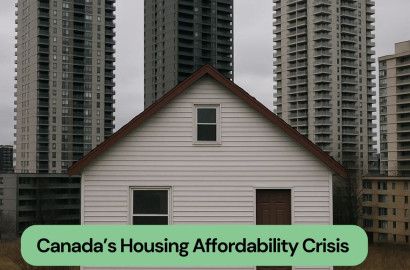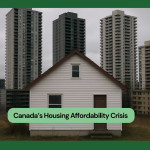The Canadian real estate landscape in 2025 is evolving faster than ever. With economic adjustments, interest rate changes, and shifting buyer preferences, investors are navigating a more complex — yet opportunity-rich — market than before.
Whether you’re a first-time investor or a seasoned property owner expanding your portfolio, understanding what’s shaping the market this year is crucial. The right strategy, guided by insight into new trends, can help you secure strong returns and stay ahead of the competition.
5 Key Real Estate Investment Trends Shaping Canada’s Property Market in 2025
The Canadian housing market continues to adapt to economic, demographic, and technological shifts. From affordability challenges to a surge in eco-conscious development, these trends are influencing where and how investors are putting their money.
Let’s explore the five biggest investment trends Canadian investors should watch closely this year — and how you can use them to your advantage.
1. Suburban and Mid-Sized Cities Are Stealing the Spotlight
While major cities like Toronto and Vancouver still attract global attention, Canada’s smaller cities and suburban regions are now offering some of the best investment opportunities.
Places such as Halifax, Kelowna, London (ON), and Saskatoon are becoming investor favourites due to affordable property prices, population growth, and expanding job markets. Improved infrastructure and remote work flexibility have made living outside city cores more appealing than ever.
Why It Matters:
Investors who diversify into mid-sized markets can benefit from higher rental yields and steady appreciation, while also avoiding overheated urban markets.
Expert Tip: Look for communities near new public transit expansions, universities, or tech hubs — these attract long-term tenants and deliver consistent returns.
2. Purpose-Built Rentals Are Becoming a Prime Investment Choice
The demand for rental housing in Canada remains stronger than ever. With affordability challenges keeping many Canadians out of homeownership, the purpose-built rental (PBR) sector has seen a sharp rise.
Cities like Calgary, Ottawa, and Edmonton are leading the charge, where vacancy rates have dropped below 2%. Investors and developers are focusing on building modern, sustainable apartments designed specifically for long-term renters.
Why It Matters:
Purpose-built rentals offer predictable income, lower turnover, and high occupancy rates. In 2025, they’re becoming a reliable way to balance risk and reward.
Expert Tip: Prioritize properties with sustainable amenities and low maintenance costs — they attract eco-conscious tenants and qualify for green tax rebates.
3. Sustainability and Green Real Estate Are Driving Profits
Sustainability has shifted from being a niche interest to a mainstream investment strategy. Buyers and renters are now prioritizing energy-efficient homes that lower utility costs and minimize environmental impact.
Green-certified homes with features like solar panels, efficient HVAC systems, and smart thermostats are not only good for the planet — they’re also commanding higher resale values.
Why It Matters:
Government programs such as the Canada Greener Homes Initiative make sustainable upgrades more affordable, helping investors enhance property value while benefiting from incentives.
Expert Tip: Renovating older units with insulation upgrades, LED lighting, or low-flow fixtures can significantly improve ROI and attract long-term tenants.
4. Immigration Continues to Drive Real Estate Demand
Canada’s immigration goals remain ambitious, welcoming over 485,000 newcomers annually through 2025. This consistent inflow of skilled professionals, students, and families is fueling strong housing demand across multiple regions.
Markets such as Mississauga, Surrey, and Winnipeg have seen rising rental prices and limited supply as a result. Investors focusing on multi-family housing or pre-construction condos are reaping the benefits of long-term demand stability.
Why It Matters:
Newcomers are a key driver of both rental and ownership markets. Their continued arrival ensures steady housing demand, even during broader economic slowdowns.
Expert Tip: Target properties near employment zones, universities, or major transit routes — they’re top choices for new residents seeking convenience.
5. Technology and Data Are Transforming Real Estate Investing
In 2025, technology isn’t just changing how Canadians buy homes — it’s reshaping how investors find, analyze, and manage properties.
AI-driven tools, big data analytics, and virtual platforms now allow investors to identify undervalued properties, predict market performance, and streamline management processes. Blockchain and tokenized property investments are also gaining traction among tech-savvy investors.
Why It Matters:
By leveraging real estate technology, investors can make faster, data-backed decisions, reduce costs, and enhance portfolio performance.
Expert Tip: Use tools that track local market metrics such as rent growth, migration data, and property appreciation — it’s the key to making smarter, faster investment choices.
Final Thoughts
The Canadian real estate market in 2025 is complex, competitive, and evolving — but it’s also filled with opportunity. Investors who adapt to these five trends will be better positioned to thrive in both the short and long term.
From exploring secondary cities to embracing sustainable development and data-driven investing, the future of Canadian real estate belongs to those who stay informed and flexible.
👉 Ready to explore the best investment opportunities across Canada?
Visit thehomess.com to browse listings, connect with trusted experts, and make your next move with confidence.
Related posts:
Canada’s housing affordability crisis continues in 2025 despite falling rates and modest price drops. Discover the key factors keeping homes out of reach for many Canadians, from supply shortages to policy misalignments and rental market pressures.
Wondering about the cost of living in Edmonton? This 2025 guide covers rent, home prices, utilities, groceries, and more to help you budget for life in Alberta’s capital.


 5 Real Estate Investment Trends Every Canadian Investor Should Know in 2025
5 Real Estate Investment Trends Every Canadian Investor Should Know in 2025  Why Canada’s Housing Affordability Crisis Isn’t Over Yet
Why Canada’s Housing Affordability Crisis Isn’t Over Yet  Cost of Living in Edmonton (2025) - Rent, Homes & Daily Expenses
Cost of Living in Edmonton (2025) - Rent, Homes & Daily Expenses  CMHC Mortgage Loan Insurance Update 2025 | MLI Select Premium Changes
CMHC Mortgage Loan Insurance Update 2025 | MLI Select Premium Changes  Big GST Relief for First-Time Home Buyers in Canada – Here’s What You Need to Know
Big GST Relief for First-Time Home Buyers in Canada – Here’s What You Need to Know